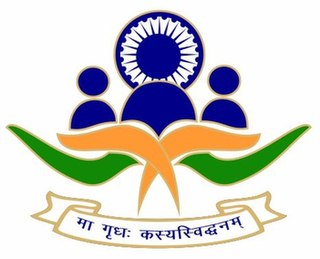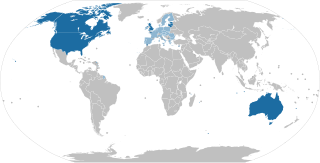
The United States Marshals Service (USMS) is a federal law enforcement agency in the United States. The USMS is a bureau within the U.S. Department of Justice, operating under the direction of the attorney general, but serves as the enforcement arm of the U.S. federal courts to ensure the effective operation of the judiciary and integrity of the Constitution. It is the oldest U.S. federal law enforcement agency, created by the Judiciary Act of 1789 during the presidency of George Washington as the "Office of the United States Marshal". The USMS as it stands today was established in 1969 to provide guidance and assistance to U.S. Marshals throughout the federal judicial districts.
A bill of attainder is an act of a legislature declaring a person, or a group of people, guilty of some crime, and punishing them, often without a trial. As with attainder resulting from the normal judicial process, the effect of such a bill is to nullify the targeted person's civil rights, most notably the right to own property, the right to a title of nobility, and, in at least the original usage, the right to life itself.
An ex post facto law is a law that retroactively changes the legal consequences of actions that were committed, or relationships that existed, before the enactment of the law. In criminal law, it may criminalize actions that were legal when committed; it may aggravate a crime by bringing it into a more severe category than it was in when it was committed; it may change the punishment prescribed for a crime, as by adding new penalties or extending sentences; it may extend the statute of limitations; or it may alter the rules of evidence in order to make conviction for a crime likelier than it would have been when the deed was committed.

The Cuban Liberty and Democratic Solidarity (Libertad) Act of 1996, Pub. L.Tooltip Public Law 104–114 (text)(PDF), 110 Stat. 785, 22 U.S.C. §§ 6021–6091) is a United States federal law which strengthens and continues the United States embargo against Cuba. It extended the territorial application of the initial embargo to apply to foreign companies trading with Cuba, and penalized foreign companies allegedly "trafficking" in property formerly owned by U.S. citizens but confiscated by Cuba after the Cuban revolution. It also covers property formerly owned by Cubans who have since become U.S. citizens.

A hoon is an Australian and New Zealander term describing a person who deliberately drives a vehicle in a reckless or dangerous manner, generally in order to provoke a reaction from onlookers.

Asset forfeiture or asset seizure is a form of confiscation of assets by the authorities. In the United States, it is a type of criminal-justice financial obligation. It typically applies to the alleged proceeds or instruments of crime. This applies, but is not limited, to terrorist activities, drug-related crimes, and other criminal and even civil offenses. Some jurisdictions specifically use the term "confiscation" instead of forfeiture. The alleged purpose of asset forfeiture is to disrupt criminal activity by confiscating assets that potentially could have been beneficial to the individual or organization.
The Confiscation Acts were laws passed by the United States Congress during the Civil War with the intention of freeing the slaves still held by the Confederate forces in the South.

Unlawful Activities (Prevention) Act is an Indian law aimed at prevention of unlawful activities associations in India. Its main objective was to make powers available for dealing with activities directed against the integrity and sovereignty of India. The most recent amendment of the law, the Unlawful Activities (Prevention) Amendment Act, 2019 has made it possible for the Union Government to designate individuals as terrorists without following any formal judicial process. UAPA is also known as the "Anti-terror law".

A Lokpal is an anti-corruption authority or body of ombudsman who represents the public interest in the Republic of India. The current Chairperson of Lokpal is Pradip Kumar Mohanty. The Lokpal has jurisdiction over central government to inquire into allegations of corruption against its public functionaries and for matters connected to corruption. The Lokpal and Lokayuktas Act was passed in 2013 with amendments in parliament, following the Jan Lokpal movement led by Anna Hazare in 2010. The Lokpal is responsible for enquiring into corruption charges at the national level while the Lokayukta performs the same function at the state level. The age of Lokpal on the date of assuming office as the chairperson or a member should not be less than 45 years.

The National Investigation Agency (NIA) is a specialized counter-terrorism law enforcement agency in India. The agency is empowered to deal with the investigation of terror related crimes across states without special permission from the states under written proclamation from the Ministry of Home Affairs. The primary mandate of the National Investigation Agency is to investigate and prosecute offenses that have national and cross-border implications, specifically focusing on terrorism, insurgency, and other related matters. It is empowered to investigate cases that involve threats to the sovereignty, security, and integrity of India. It has the authority to conduct searches, seizures, and arrests, as well as to collect evidence and maintain a database of terrorist organizations and their members.

The Directorate of Enforcement (ED) is a domestic law enforcement agency and economic intelligence agency responsible for enforcing economic laws and fighting economic crime in India. It is part of the Department of Revenue, Ministry of Finance, Government Of India. The Enforcement Directorate focuses on investigating and prosecuting cases related to money laundering, foreign exchange violations, and economic offenses. Its primary objective is to curb the generation and circulation of black money and to ensure compliance with the laws concerning foreign exchange and prevention of money laundering. However, targets of the enforcement directorate have claimed that the they misuse powers against activists, scholars, and political rivals.

The Code of Criminal Procedure commonly called Criminal Procedure Code (CrPC) is the main legislation on procedure for administration of substantive criminal law in India. It was enacted in 1973 and came into force on 1 April 1974. It provides the machinery for the investigation of crime, apprehension of suspected criminals, collection of evidence, determination of guilt or innocence of the accused person and the determination of punishment of the guilty. It also deals with public nuisance, prevention of offences and maintenance of wife, child and parents.

The Enemy Property Act, 1968 is an Act of the Parliament of India, which enables and regulates the appropriation of property in India owned by Pakistani nationals. The act was passed following the Indo-Pakistani War of 1965. Ownership is passed to the Custodian of Enemy Property for India, a government department. There are also movable properties categorized as enemy properties.

The European Union (Withdrawal) Act 2018 is an Act of the Parliament of the United Kingdom that provides both for repeal of the European Communities Act 1972, and for parliamentary approval to be required for any withdrawal agreement negotiated between the Government of the United Kingdom and the European Union. The bill's passage through both Houses of Parliament was completed on 20 June 2018 and it became law by Royal Assent on 26 June.
Triple talaq and talaq-e-mughallazah are now-banned means of Islamic divorce previously available to Muslims in India, especially adherents of Hanafi Sunni Islamic schools of jurisprudence. A Muslim man could legally divorce his wife by proclaiming three times consecutively the word talaq.

The Muslim Women Act, 2019 is an Act of the Parliament of India criminalising triple talaq. In August 2017, the Supreme Court of India declared triple talaq, which enables Muslim men to instantly divorce their wives, to be unconstitutional. The minority opinion suggested the Parliament to consider appropriate legislation governing triple talaq in the Muslim community.
The Punjab National Bank Fraud Case relates to fraudulent letter of undertaking worth ₹12,000 crore issued by the Punjab National Bank at its Brady House branch in Fort, Mumbai; making Punjab National Bank liable for the amount. The fraud was allegedly organized by jeweller and designer Nirav Modi. Nirav, his wife Ami Modi, brother Nishal Modi and uncle Mehul Choksi, all partners of the firms, M/s Diamond R US, M/s Solar Exports and M/s Stellar Diamonds; along with PNB officials and employees, and directors of Nirav Modi and Mehul Choksi's firms have all been named in a charge sheet by the CBI. Nirav Modi and his family absconded in early 2018, days before the news of the scam broke in India.

The New Zealand Vehicle Confiscation and Seizure Bill was a Government bill introduced to the NZ Parliament on 26 March 2009.
The Transgender Persons Act, 2019 is an act of the Parliament of India with the objective to provide for protection of rights of transgender people, their welfare, and other related matters. The act was introduced in the Lok Sabha, the lower house of the Parliament, on 19 July 2019 by the Minister of Social Justice and Empowerment, Thawar Chand Gehlot, in light of the lapse of the Transgender Persons Bill, 2018. The 2019 act and the immediately preceding 2018 bill, were both preceded by a 2016 version. They were met with protests and criticism by some transgender people, lawyers, and activists in India. The 2016 bill was sent to a standing committee which submitted its report in July 2017. Following this, the Lok Sabha tabled and passed a newer version of the bill in December 2018. However, it did not incorporate many of the committee's recommendations. Although members of the opposition criticised the 2019 act and assured activists that they would not vote in favour of it, it was passed by the Lok Sabha on 5 August 2019 and by the Rajya Sabha, the upper house of the Parliament, on 26 November 2019. The president assented to it on 5 December 2019, upon which the act was published in the Gazette of India. It has been in effect since 10 January 2020 following a notification of the same in the Gazette on the same day.

Magnitsky legislation refers to laws providing for governmental sanctions against foreign individuals who have committed human rights abuses or been involved in significant corruption. They originated with the United States which passed the first Magnitsky legislation in 2012, following the torture and death of Sergei Magnitsky in Russia in 2009. Since then, a number of countries have passed similar legislation such as Canada, the United Kingdom and the European Union.











